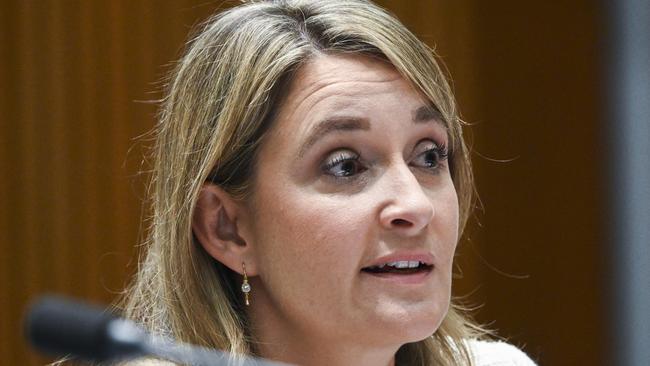Optus chief Kelly Bayer Rosmarin resigns from top job
Kelly Bayer Rosmarin says she came to the decision that her immediate resignation is in the best interest of Optus.

Optus chief executive Kelly Bayer Rosmarin has resigned with immediate effect from the troubled telco after this month’s massive outage cut off more than 10 million Australians – leaving some not even able dial triple-0.
It was the second reputational disaster on Ms Bayer Rosmarin’s watch after last year’s cyber attack, where her response – like the outage – was widely criticised.
Ms Bayer Rosmarin said that it had been an honour to serve as Optus CEO – a role she has held since April 1, 2020. But she said that it was an appropriate time to step down.
Her resignation comes amid a broader shake-up of the telco with its Singapore parent installing former Optus business managing director Peter Kaliaropoulos in the newly created position of chief operating officer. He will start on Wednesday.
Optus chief financial officer Michael Venter is acting as interim CEO as a search for a permanent replacement begins.
While Ms Bayer Rosmarin has resigned with immediate effect, she said in a note to staff that: “I will of course be available to support a smooth transition”.
“On Friday I had the opportunity to appear before the Senate to expand on the cause of the network outage and how Optus recovered and responded. I was also able to communicate Optus’ commitment to restore trust and continue to serve customers,” she said.
“Having now had time for some personal reflection, I have come to the decision that my resignation is in the best interest of Optus moving forward.
“It’s been an honour and privilege to lead the team at Optus and to serve our customers. I am proud of the team’s many achievements. I wish everyone and the company every success in the future.”
Ms Bayer Rosmarin revealed at the inquiry – where Senators branded her communication “lousy” and her evidence “fluffy” – that Optus did not plan for a national outage, and she was not aware of the extent of the crisis until 3½ hours after the network collapsed.
The inquiry capped off a week of blame games, including Optus fingering its Singapore government-controlled owner Singtel, which “triggered” the outage following a “routine upgrade”.
Twenty-four hours later, Singtel issued its own statement saying its upgrade was not the root cause, prompting Optus to clarify that the fault was entirely within its own network.
Ms Bayer Rosmarin praised her team for their handling of the outage, telling Senators they “did the best they could”. In a note to staff she said the were “the stars in our universe”. “I know you will continue to collaborate with purpose and prioritise our customers’ needs in the weeks and months to come”.
Among Optus’s current executive ranks, former NSW premier Gladys Berejiklian, who is the executive in charge of managing the telco’s business customers, is expected to put her hand up for the CEO role.
But a potential handicap in the way of Ms Berejiklian’s ascendancy at Optus could be the Independent Commission Against Corruption’s finding that she engaged in serious corrupt conduct while NSW Premier – a finding which she is appealing.
Singtel group chief executive Yuen Kuan Moon said Ms Bayer Rosmarin had helmed Optus during a “challenging period”. He said Singtel – which is controlled by the Singapore government – recognised that Optus needed to regain customer trust.
“Optus appointed Kelly at the beginning of the pandemic, and we acknowledge her leadership, commitment and hard work throughout what has been a challenging period and thank her for her dedication and service to Optus,” he said.
“Kelly has always led with integrity and had all stakeholders’ best interests at heart. We understand her decision and wish her the very best in her future endeavours.”

“We recognise the need for Optus to regain customer trust and confidence as the team works through the impact and consequences of the recent outage and continues to improve. Optus’ priority is about setting on a path of renewal for the benefit of the community and customers.”
Mr Yuen said Optus was an “integral part” of Singtel’s business. “We view the events in recent weeks very seriously,” he said.
“We fully recognise the importance of Optus’ role in providing connectivity services to the community and the importance of network resiliency and security. That is a top priority in all markets where our companies operate in. I have every confidence our Optus team will exert all efforts to deliver for customers and regain their trust and confidence.”
Ms Bayer Rosmarin’s resignation comes as The Australian revealed that last year’s cyber attack cost Optus $140m – and the damage bill from the outage was expected to be three times higher.
Maybank – one of Asia’s biggest banks – estimated that compensation claims could hit $400m and told Singtel investors that it expects customers to ditch Optus for rivals Telstra and TPG-owned Vodafone, further eroding earnings.
Once considered a cash cow for Singtel, Optus now requires heavy investment to upgrade the network to 5G as well as to repair the damage from last year’s cyber attack and this month’s outage.
The cyber attack pushed Optus into a $79m loss last financial year after it set aside $140m to cover associated costs.
Optus’s net assets, including debt, now total about $10bn. This compares with the $17.5bn Singtel paid to acquire Optus in 2001 and is a fraction of the total cash it has injected into its Australian network.
Ms Bayer Rosmarin revealed at the Senate inquiry into the outage on Friday that Singtel has so far invested “more than $42bn in the networks in Australia for very low returns”.





